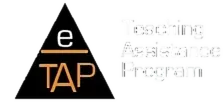ACT Prep: Standard Written English and Rhetorical Skills
70 Questions, 45 Minutes
Math | Life Science/Biology | Physical Science/Chemistry, Physics | Earth and Space Science | English
eTAP provides practice exercises, practice tests and instructional resources for ACT. Please visit the ACT site for ACT requirements.
ACT Topics |
eTAP Lessons |
Usage/Mechanics |
|
| Punctuation (13%). Questions in this category test your knowledge of the conventions of internal and end-of-sentence punctuation, with emphasis on the relationship of punctuation to meaning (for example, avoiding ambiguity, indicating appositives). |
Understand Sentence Construction |
| Grammar and Usage (16%). Questions in this category test your understanding of agreement between subject and verb, between pronoun and antecedent, and between modifiers and the word modified; verb formation; pronoun case; formation of comparative and superlative adjectives and adverbs; and idiomatic usage. | Demonstrate the Understanding of Proper English Usage and Grammar |
| Sentence Structure (24%). Questions in this category test your understanding of relationships between and among clauses, placement of modifiers, and shifts in construction. | Understand Sentence Construction Identify Correctly Used Clauses |
Rhetorical Skills |
|
| Strategy (16%). Questions in this category test how well you develop a given topic by choosing expressions appropriate to an essay's audience and purpose; judging the effect of adding, revising, or deleting supporting material; and choosing effective opening, transitional, and closing sentences. | Elements of Discourse (Grades 11-12) Structuring Ideas and Arguments (Grades 11-12) Natural, Fresh, and Vivid Language Usage (Grades 11-12) |
| Organization (15%). Questions in this category test how well you organize ideas and judge the relevance of statements in context (making decisions about order, coherence, and unity). |
Active Verb Usage (Grades 9-10) |
| Style (16%). Questions in this category test how well you select precise and appropriate words and images, maintain the level of style and tone in an essay, manage sentence elements for rhetorical effectiveness, and avoid ambiguous pronoun references, wordiness, and redundancy. |
Elements of Discourse (Grades 11-12) Reaching Rhetorical and Aesthetic Purposes (Grades 11-12) |
ACT Prep - Reading Test: Reading Comprehension40 questions, 35 minutes |
|
| Social Studies (25%). Questions in this category are based on passages in the content areas of anthropology, archaeology, biography, business, economics, education, geography, history, political science, psychology, and sociology. | Grade 10 Social Studies Grade 11 Social Studies Grade 12 Social Studies |
| Natural Sciences (25%). Questions in this category are based on passages in the content areas of anatomy, astronomy, biology, botany, chemistry, ecology, geology, medicine, meteorology, microbiology, natural history, physiology, physics, technology, and zoology. | |
| Prose Fiction (25%). Questions in this category are based on intact short stories or excerpts from short stories or novels. | Text Analysis |
| Humanities (25%). Questions in this category are based on passages from memoirs and personal essays and in the content areas of architecture, art, dance, ethics, film, language, literary criticism, music, philosophy, radio, television, and theater. | Literary Criticism |


